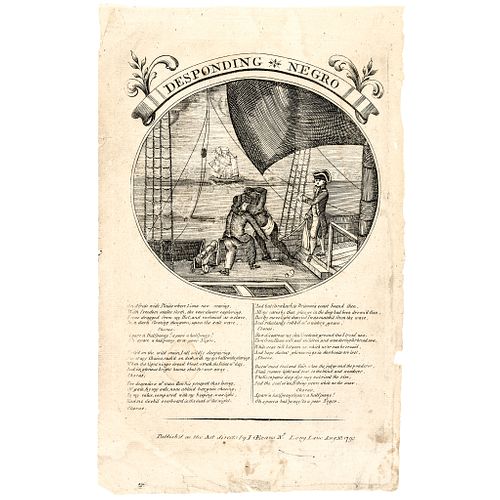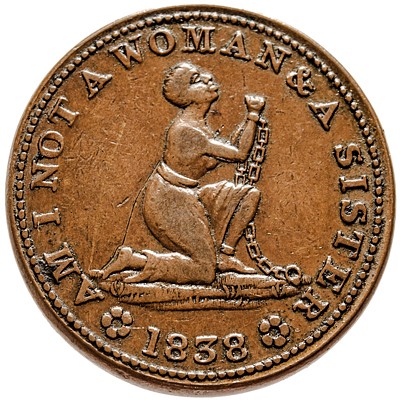1792 THE DESPONDING NEGRO Illustrated Printed Poem by John Collins
Lot 52
Categories
Estimate:
$2,000 - $2,800
Absentee vs Live bid
Two ways to bid:
- Leave a max absentee bid and the platform will bid on your behalf up to your maximum bid during the live auction.
- Bid live during the auction and your bids will be submitted real-time to the auctioneer.
Bid Increments
| Price | Bid Increment |
|---|---|
| $0 | $10 |
| $200 | $20 |
| $300 | $25 |
| $500 | $50 |
| $1,000 | $100 |
| $2,000 | $200 |
| $3,000 | $250 |
| $5,000 | $500 |
| $10,000 | $1,000 |
| $20,000 | $2,000 |
| $30,000 | $2,500 |
| $50,000 | $5,000 |
| $100,000 | $10,000 |
| $200,000 | $20,000 |
| $300,000 | $25,000 |
| $500,000 | $50,000 |
About Auction
By Early American History Auctions
Feb 27, 2021
Set Reminder
2021-02-27 12:00:00
2021-02-27 12:00:00
America/New_York
Bidsquare
Bidsquare : Black History & Slavery, Historic Autographs, Colonial America & Weapons
https://www.bidsquare.com/auctions/early-american-history-auctions/black-history-slavery-historic-autographs-colonial-america-weapons-6434
318 Lots of Rare, Historic Autographs, Americana, Civil War Era, George Washington, Abraham Lincoln, Slavery & Black History, Revolutionary War Era, Colonial America, Federal Period, War of 1812, Colonial Currency, Historic Early American Guns & more... Early American History Auctions auctions@earlyamerican.com
318 Lots of Rare, Historic Autographs, Americana, Civil War Era, George Washington, Abraham Lincoln, Slavery & Black History, Revolutionary War Era, Colonial America, Federal Period, War of 1812, Colonial Currency, Historic Early American Guns & more... Early American History Auctions auctions@earlyamerican.com
- Lot Description
Black History
1792 THE DESPONDING NEGRO Illustrated Slave Poem
August 30, 1792-Dated Federal Period, Black History Graphically Illustrated Engraved Printed Poem titled, "THE DESPONDING NEGRO" by John Collins, Choice Very Fine.
Exceedingly rare Black History related historic Printed Poem measures about 6.75 x 10.5" (by sight), matted to an overall size of 12" x 16" with some slight even tone. This remarkable Anti-Slavery Poem by John Collins was first written in 1792 titled, "The Desponding Negro, a Song". This was part of a collection of poems first complied for printing in "Scripscrapologia" in which songs are adapted to different tunes.
The rhyming scheme and the light-hearted attitude of this poem suggests that it may have been a musical number in one of Collins's plays. The dramatic large circular illustration above the printed poem verse depicts a Black African being snatched from his home and into Slavery. He runs on the deck of the Slave Ship, only to be struck and blinded by a bolt of lightning. He would now have more costs to support than he can be sold for, so he is tossed overboard. A passing ship rescues him from death, and he becomes a beggar. But God will rectify the situations of all who are outcast by Christians. However, the Black man is still begging the White Christians for money at the close of the poem. Ready for framing and display. This important Black history Anti-Slavery poem reads, in full:
"THE DESPONDING NEGRO
On Afric's wide Plains, where the Lion now roaring,
With Freedom stalks forth, the vast Desert exploring,
I was dragg'd from my Hut, and enchain'd as a Slave,
In a dark floating Dungeon, upon the salt Wave.
(Chorus)
Spare a Halfpenny! Spare a Halfpenny!
spare a Halfpenny to a poor Negro.
Toss'd on the wild Main, I all wildly despairing,
Burst my Chains, rush'd on Deck, with mine Eye-balls wide glaring,
When the Lightning's dread Blast struck the Inlets of Day,
And its glorious bright Beams shut for ever away. (Chorus)
The Despoiler of Man, then, his Prospect thus losing,
Of Gain by my Sale, not a blind Bargain choosing,
As my Value, compar'd with my Keeping, was light,
Had me dash'd overboard, in the Dead of the Night. (Chorus)
And but for a Bark, to Britannia's Coast bound then,
All my Cares by that Plunge in the Deep had been drown'd then;
But by Moonlight descry'd, I was snatch'd from the wave,
And reluctantly robb'd of a watery Grave. (Chorus)
How disastrous my Fate, Freedom's Ground though I tread now,
Torn from Home, Wife, and Children, and wand'ring for Bread now;
While Seas roll between us, which ne'er can be cross'd,
And Hope's distant Glimm'rings in Darkness are lost. (Chorus)
But of Deeds fair and foul, when the Judge and the Ponderer,
Shall restore Light and Rest to the Blind and the Wanderer,
May the poor Sable Flock, here by Christians outcast,
Find a peaceful long Home their sweet Refuge at last. (Chorus)
Spare a Halfpenny, spare a Halfpenny;
O, spare a Halfpenny to a poor Negro.
John Collins (1742-1808) was an actor, poet, orator, and musical entertainer well known and respected throughout England and Ireland. The son of a tailor, he was born and raised in Bath, where he was schooled to become a staymaker. However, with his first on-stage performance in Bath at an early age, and another in Smock Alley, Dublin at age twenty-two, it was evident that Collins had a different profession in mind.
As Collins traveled around, gaining popularity, he performed in a variety of plays ranging from tragedies and comedies to farces and comic operas. Years later, he composed "The Brush" ( "Lecture on Oratory"), a collection of theatrical stories and songs, on which he would lecture at the local taverns of England and Ireland. In 1793, Collins settled down in Birmingham, where he later printed Scripscrapologia, a collection of poems encompassing a great range of different topics, including "To-morrow," "The Desponding Negro," and original poems from "The Brush" (all to be adapted to popular tunes). Soon after this, Collins suffered from a severe illness and died in Birmingham on May 2, 1808.
Our Auction Contents:
Black History & Slavery: (Lots 1 - 63)
Abraham Lincoln Related: (Lots 64 - 74)
Historic Autographs: (Lots 75 - 235)
Colonial America: (Lots 236 - 261)
Revolutionary War: (Lots 262 - 304)
George Washington Related: (Lots 305 - 306)
Early American Guns & Weapons: (Lots 307 - 318) - Shipping Info
-
Early American provides in-house worldwide shipping. Please contact us directly if you have questions about your specific shipping requirements.
-
- Buyer's Premium



 EUR
EUR CAD
CAD AUD
AUD GBP
GBP MXN
MXN HKD
HKD CNY
CNY MYR
MYR SEK
SEK SGD
SGD CHF
CHF THB
THB












